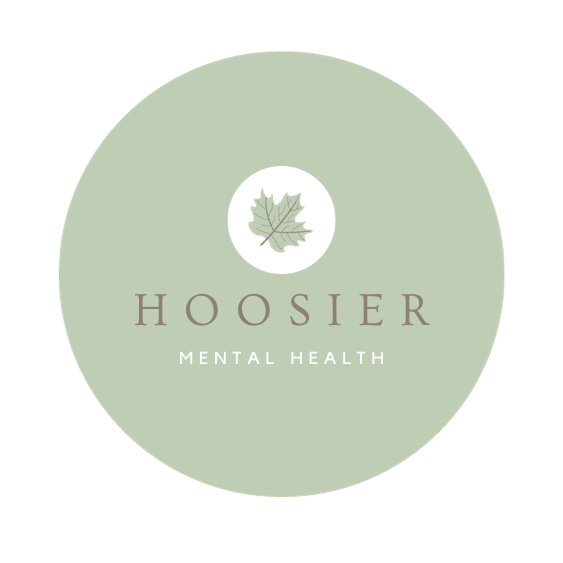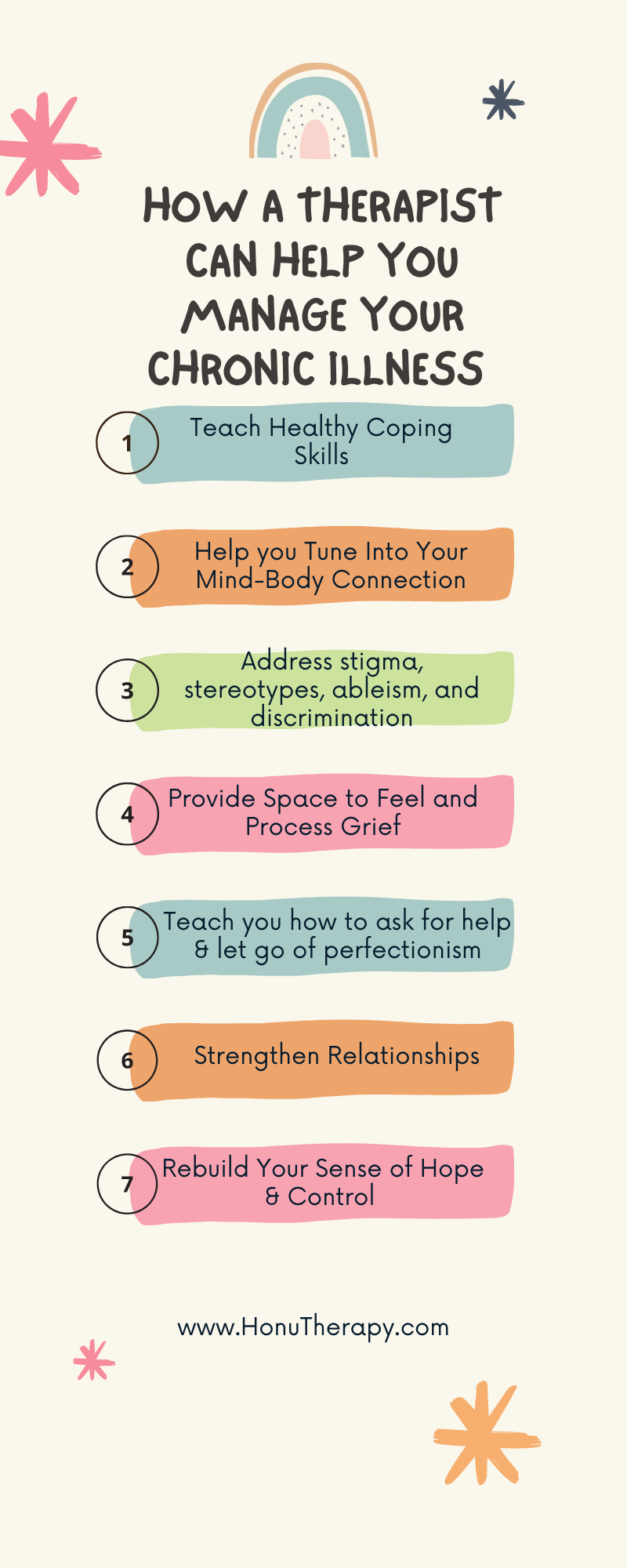I Have a Chronic Illness. Can a Therapist Help Me Cope?
Are you living with a chronic illness and struggling to cope with all of the stress you’re under?
Have your loved ones noticed a change in your mood and told you, “Maybe it’s time to find a therapist to talk to”?
You’re not alone!
Questions like this are very common: How do I find a therapist? Is therapy right for me? How do therapists help?
As you continue on in this article, you’ll learn about: chronic illness and how it impacts mental health, how therapy can help you cope, when it might be time to consider finding a therapist, and how find a therapist.
What is a chronic illness?
We hear the terms chronic illness, chronic conditions, and chronic disease, but what exactly are they? The CDC (2021) defines them as, “Chronic diseases are defined broadly as conditions that last 1 year or more and require ongoing medical attention or limit activities of daily living or both,” (CDC.gov, 2021).
Some examples of chronic illnesses include: arthritis, chronic kidney disease, diabetes, heart disease, and certain types of cancer to name a few. Each of these diagnoses require different adjustments in your life, as well as the types of treatment you would expect to receive.
In general, they do not go away on their own and usually don’t clear up completely. Treatment for chronic illness depends on the severity of the symptoms, the impact on function, risks, how it is managed, accessibility, among other factors.
The number of people living with chronic conditions is staggering and continues to rise. According to Raghupathi and Raghupathi (2018), “Nearly half (approximately 45% of 133 million) of all Americans suffer from at least one chronic disease and the number is growing”, (Raghupathi & Raghupathi, 2018).
This is a public health issue as limited access to quality healthcare and preventative health means that people who are sick are getting sicker and more people are starting to get sick.
How does chronic illness affect mental health?
The Mind-Body Connection
We often think of the mind and the body as two separate things. This couldn’t be further from the truth!
There is a very close relationship between mental health and physical health. It’s known as the mind-body connection, which is the relationship between physical and mental health and the impact they have on one another.
For instance, if you are having trouble sleeping because you just can’t turn your brain off no matter how hard you try, you will probably feel tired, moody, have difficulty concentrating, may feel tense, have trouble problem-solving, etc.
Difficulty sleeping also makes us susceptible to a decreased immune system. This means that we are more likely to: get sick more often, experience more pain in the body, have a lower quality-of-life, develop other conditions, and have an overall decline in our physical health.
Unfortunately, we can’t just ignore these problems in hopes that they’ll just go away. In fact, the longer we ignore them, they’re likely to become more complex and overwhelming.
Still not convinced?
Think of it this way: If you broke your leg and couldn’t walk on it, you’d probably go to the doctor to get it taken care of right away. Your doctor would help come up with a plan to treat it and help it heal as quickly as possible.
Mental health is no different! Your brain is a body part–just like your leg. It needs attention, support, and a plan to help heal when it’s feeling worn down.
Stressors and Risk Factors
“If you broke your leg and couldn’t walk on it, you’d probably go to the doctor and get it taken care of right away. Mental health is no different! Your brain is a body part—just like your leg. It needs attention, support, and a plan to help heal when it’s feeling worn down.”
There is a strong connection between physical illness and poorer mental health outcomes. People living with chronic illness are at a higher risk for also experiencing increased symptoms of stress, depression and anxiety. This risk is even higher for people who have a history of depression, anxiety, or suicidal thoughts.
Certain conditions, as well as some medications can also make people more susceptible to depression and anxiety. For instance, studies consistently show that one-third of all stroke survivors will develop post-stroke depression (Towfighi et. al, 2017).
This is due to a number of complex biochemical changes (the way the chemicals in our body work and react) in the brain, loss or impairment of functioning and mobility, and changes in social relationships.
When I worked in the Neuroscience Intensive Care Unit (NICU) with patients who had suffered from a stroke, it was very common for me to assess symptoms of depression.
I would also provide their family members with education on the relationship between strokes and increased risk for depression. I would also provide them with education on symptoms to look for and how to help their loved one get help if they saw any changes.
In addition to changes in the brain’s chemistry, there are other risk factors that increase the risk of depression and anxiety.
These include:
Treatment burden–Treatment burden is the emotional, physical, social, energetic, fiscal and time-intensive toll a person experiences as a result of managing their health. It can be the pain associated with needle sticks, dietary changes, frequent appointments, medication schedules, etc.
Feeling unheard and social isolation–Not feeling heard or listened to by your healthcare provider, family, friends, partner, employer, etc. can feel incredibly invalidating and isolating.
Pain–Pain impacts our sleep quality, mobility, function, focus, and energy. When our pain is chronic, our stress hormones can be really high, which can make us very sensitive to those symptoms. When it comes to pain, our body is highly intuitive and connected in many ways. So, what impacts one part of the body can have parallel impacts on other parts.
According to Bruce (2021), “Depression and chronic pain share some of the same neurotransmitters--brain chemicals that act as messengers traveling between nerves. Depression and chronic pain also share some of the same nerve pathways in the brain and spinal cord, (Bruce, 2021).
This means that we cannot look at a person’s symptoms in parts. Your body is a complex, interconnected system! Your healthcare team must look at you as a whole person. To do this, they must look at you as a person who is experiencing symptoms and risk factors. These symptoms and risk factors can lead to either relief or worsening illness if they are not looked at as one big, connected system.Grief with diagnosis–Many people who are diagnosed with chronic illnesses, as well as people who live with tough symptoms like pain experience grief. This is a natural reaction, but there are times where certain diagnoses and conditions lead to trauma responses.
Research indicates that, “Approximately 40% of patients with cancer experience significant emotional and social distress during treatment, with approximately one-third of patients developing distress that requires specialized intervention,” (Leano et. al, 2019).Increased stress–The stress from treatment burden, pain, uncertainty over the future, juggling multiple demands, quality-of-life challenges, social isolation, prognosis (what doctors predict your illness will look like, how it will progress, etc.) all cause bodily stress.
“We cannot look at a person’s symptoms in parts. Your body is a complex interconnected system!”
Depression and Anxiety
It is very common to feel sad after being diagnosed with a health condition, being hospitalized, having to adjust to changes in mobility and function, and the strain that comes with managing your symptoms.
You may have worries about the future of your health, your family, your relationships, your independence, your finances (How I afford treatment, time off, and my medications?), and if you’ll ever feel in control again.
When this sadness or worry lasts for more than a few weeks and your distress starts to impact your life, this might mean that you are feeling depressed.
Depression and anxiety both negatively impact your mood, how you feel, how you think, and how you function. Depression and anxiety are very common and treatable conditions.
According to the National Institute of Mental Health (2021), “Research suggests that people who have depression and another medical illness tend to have more severe symptoms of both illnesses,” (National Institute of Mental Health, 2021).
People living with chronic conditions are at a higher risk for feeling depression and anxiety that is related directly to their illness. This means that even people who have not experienced these symptoms before are more likely to feel depressed and anxious because of the challenges related to their health.
Depression can feel like it’s never-ending, really heavy, and overwhelming. There are times where depression can become so painful that you may have thoughts of suicide.
Even if you don’t have a plan and know that you don’t want to die, suicidal thoughts can feel scary. Suicidal thoughts are often our brain’s way of recognizing that we are in pain and that we want an end to the pain, not our life.
Feeling depressed or anxious doesn’t mean you’re weak.
You’re not faking it.
It’s not “all in your head”.
You’re not “choosing to be sad”.
You’re not crazy.
You’re not a burden.
You’re human.
You’re a human who is experiencing pain and you’re not alone.
You matter.
**If you are having suicidal thoughts, please call 9-1-1 or go to the nearest emergency room.
“Feeling depressed or anxious doesn’t mean you’re weak.”
What is therapy?
Therapy is a confidential space where you can talk with a trained therapist about your challenges. Using their training, research, evidence-based practices, your strengths, and your interests, therapists work alongside you to create specific, individualized treatment plans to help you reach your goals.
Therapy is not the same as talking to a friend. While a therapist should be kind, compassionate, and non-judgmental like a friend might be, therapists are legally and ethically bound to provide one-sided support in your session.
This means that your therapist can’t come to your birthday party, go watch a movie with you, or be your friend on Facebook. It doesn’t mean that your therapist doesn’t care about you, but it helps protect boundaries that are associated with your therapeutic relationship.
On average, most clients need at least 3 months (between 8-12 hour-long sessions) to really start experiencing the change in their lives they are seeking.
However, depending on the nature and impact of the challenges being worked through, there are clients who may need to see a therapist for 12+ months.
When is the right time to find a therapist?
So you may not be feeling well, but how do you know if you need a therapist? While every person’s choice to start therapy is an intimate and personal decision, there are some common signs that can help you consider therapy.
Stress, depression, and anxiety impact us all from time-to-time, but it becomes more challenging when we feel these things for long periods of time (usually more than a couple of weeks), our symptoms start to worsen, and we don’t feel like we have the tools to cope.
The 12 most common signs people consider before starting therapy include:
Your mood has changed
Ask yourself:
Am I feeling more sad, worried, frustrated, or irritated than normal?
Am I having difficulty in controlling my emotions?
Have I been snapping at my friends, family, or co-workers?
Have I been crying more than normal?Your sleep habits have changed
Ask yourself:
Am I sleeping more than usual and still not feeling rested when I wake up?
Am I having trouble getting through the day without having to take naps?
Am I drinking more caffeine than normal?
Am I having trouble falling asleep, staying asleep, or am I tossing and turning?
Do I have racing thoughts that I can’t seem to turn off before bed?Your eating habits have changed
Ask yourself:How has my appetite been?
Am I eating less than normal and even my favorite foods just don’t interest me?
Am I eating more than normal or finding myself eating for comfort?
Am I craving junk foods?
Have I unintentionally lost or gained weight?You are feeling more isolated from others
Ask yourself:
Have I been turning down opportunities to see friends or family?
Have I been avoiding answering phone calls, texts, or messages from others?
Do I have anyone I can talk to about my struggles?
Do the people around me try to tell me to “Look on the bright side” or “Just get over it”?
Do I feel judged or misunderstood by the people around me?
Do I feel like I’m letting other people down?
Am I apologizing to others for things beyond my control?You aren’t enjoying hobbies or activities that bring you joy
Ask yourself:
When was the last time I read a good book, listened to my favorite music, played games, painted, or spent time outside?
Are the things I usually enjoy doing helping me feel recharged or does the thought of doing these activities make me feel exhausted?You are having a harder time taking care of your responsibilities
Ask yourself:
Am I falling behind at work?
Am I falling behind on household chores?
Do I find myself too tired to get out of bed or off the couch to get tasks done?
How often am I taking a shower, taking my medications, brushing my teeth, or changing my clothes?
Am I having a hard time concentrating and focusing on tasks?
Does it feel like there’s so much to be done that I get overwhelmed and give up before starting?Things just feel hopeless
Ask yourself:
Have I been having suicidal thoughts?
Even if I wouldn’t do anything about it, have I thought, “Things just feel hopeless” or “I just want the pain to go away” or “It would just be better if I didn’t wake up” or “I’m a burden to those around me”?
Am I feeling stuck?You have started to use substances or other outside sources to cope or numb
Ask yourself:
Has my drinking or drug use increased?
Am I using alcohol or drugs to quiet my brain, help me sleep, relieve pain symptoms, or help me get through social situations?
Have I been smoking more?
Have I been zoning out on social media or TV more lately?
Have I been spending a lot of time shopping and buying things I don’t need?
Am I spending more time trying to avoid my feelings?
Am I staying on autopilot?
Am I over-functioning (striving for perfection and doing more than is healthy or necessary to cope with anxiety) and wishing that I knew how to slow down?Your physical symptoms have become a problem
Ask yourself:
Have I talked to my doctor? Are my symptoms a part of my illness or did my doctor determine they were from something else? Is there anything that can be done medically to reduce my symptoms?
Are they getting worse with stress?
Do I feel like I have control over my body or symptoms?
Do I know how to listen to my body and its needs?You have experienced trauma
Ask yourself:
Does the world feel safe or scary?
Do I know how to identify and cope with my triggers in a healthy way?
Have I had the time and space needed to safely grieve and process this pain?Nothing else has worked and you just don’t know where to start
Ask yourself:
Have I tried to find solutions to my problems and haven’t found anything to help me feel better?
Do I even know where to start to find solutions to my problems?
Do my problems seem too overwhelming to handle alone?
Do things feel like they’re getting worse or piling up?You are struggling to figure out who you are
Ask yourself:
What are my values? How do I know when I am living within those values?
Do I know how to offer myself compassion?
Am I spending time people-pleasing and ignoring my own needs?
How much time have I spent trying to figure out what my body can do?
What impact has my illness had on my self-esteem?
What messages have I heard about my body from other people that have impacted me mentally?
Do any of these sound like challenges you’re experiencing? If so, then it might be a good time to consider finding a therapist!Remember: You don’t have to be in crisis to find therapy helpful.
What is a therapist’s role in helping you manage your chronic illness?
You might have heard that finding a therapist who has experience in working with people living with a chronic illness is important. But why?
There are many complex challenges and concerns that someone living with chronic illness and pain deal with. It’s important to know that the therapist you are working with can provide a non-judgmental and safe space to process all of your feelings and experiences.
They recognize that no two people experience loss, transition, pain, and illness the same way. The challenges associated with pain and chronic illness can be: physical, emotional, financial, social, legal, traumatic, time consuming, energetically draining, complex and uncertain.
A therapist who specializes in chronic illness can help you:
Learn new healthy coping skills: They can help you strengthen the coping skills you already have and develop new ones
Tune into your mind-body connection: Therapists can help you learn to check in with your body’s signals, learn strategies to preventatively manage stress and pain, and learn how to respond to stress to manage it in the moment.
Increase Distress Tolerance: Learn more about the challenges and adjustments that you’re experiencing, how to sit with difficult emotions and pain, and how you can navigate them with more control
Address Societal Challenges: Challenges like stigma, stereotypes, ableism, and discrimination can make you feel powerless. They can help with self-advocacy, as well as offer connection to supports that are working to dismantle these systems of oppression on a broader level.
Offer Space for Validation and Processing: They aren’t afraid to sit with you when it comes to the heavy stuff. Therapists help provide space to vent feelings and frustrations. They also help you process fears about the future, negative self-talk, and cognitive distortions (patterns of thought or beliefs that are inaccurate and skewed towards the negative).
Strengthen your Support System: They help role play difficult conversations with friends, family, co-workers, employers, romantic partners, and medical professionals. They assist with connecting to outside supports. They also help you strengthen your relationship with yourself, your body, your identity, and your existing relationships with others.
Grieve: They help you mourn what was, while also navigate what is as you go forward.
Letting Go: They are highly trained in giving you tools to ask for help and let go of perfectionism.
Hope and Control: They also help you build your sense of hope for a better future—A future where you are in the driver’s seat and have more control over your life.
And so much more!
Types of therapy to help cope with chronic illness
There are many types of therapy that can help you with coping and healing, but here are a few basic styles that you might be interested in. You can always ask a therapist you’re interested in working with if they’re trained in the following types of therapy:
Cognitive Behavioral Therapy (CBT)- CBT is a type of therapy that focuses on the relationship between our thoughts, feelings, and behaviors.
For instance, if you have a pain flare up, you might think, “Will this ever end? I’ll never feel better. I should just give up!” This might lead you to stop taking your medications, ignore your diet restrictions, stop exercising, and miss doctor appointments.CBT is very goal-oriented and focuses on identifying, interrupting, and shifting negative thought patterns and behaviors.
Acceptance and Commitment Therapy (ACT)-ACT is a type of therapy that focuses on increasing psychological flexibility (being aware of and accepting how you’re feeling without having to do anything about it), alongside goal-directed and value-consistent behavior.
For instance, your pain flare-ups might be so rough that you stop accepting invites to hang out with friends, stop participating in your favorite hobbies, and spend more time isolated and inactive.
While it is so important to listen to your body, hiding out and avoiding pain at all costs actually makes the majority of your focus become about it. Ultimately, this can lead to more pain experiences and poorer quality of life.According to Dahl and Lundgren (2015), “The basic premise of ACT as applied to chronic pain is that while pain hurts, it is the struggle with pain that causes suffering. In the case of chronic pain, causal and maintaining factors may be unclear, and efforts to reduce or eliminate the pain may be unsuccessful.
In these cases, continuing attempts to control pain may be maladaptive, especially if they cause unwanted side effects or prevent involvement in valued activities, such as work, family, or community involvement,” (Dahl & Lundgren, 2015).
As such, ACT focuses on recognizing that pain is a part of life’s experience and finding ways to to move in directions that are in alignment with your values.Grief Counseling-Grief itself is about loss. While this may include death, it can also show up through the many transitions we face in our lives. It is mourning what was and trying to figure out what is as you go forward.
Grief therapists help with many types of grief, which include:Cumulative (many losses or transitions), disenfranchised (not appreciated or well-understood by others i.e. End-Stage Renal Disease and missing the freedom you once enjoyed before dialysis), anticipatory (an approaching loss), acute (currently in crisis), etc.
Narrative Therapy-This type of therapy focuses on the stories we tell ourselves and how they shape our identities. Through therapy, you learn to understand your story, separate your story from who you are (i.e. “I am me, I am not my illness”), and allow you to rewrite your story with healthier and more empowering language.
Ecotherapy-Ecotherapy is a broad description that involves harnessing the combined power of the mind-body connection, nature, and a clinician’s therapeutic interventions to enhance a person’s overall well-being.
It is derived from Ecopsychology, which finds that there is an innate relationship found in the interactions between nature and human beings’ survival and well-being. It is the intrinsic connectedness that we have evolved from our experiences in nature, and it is critical to our survival as a species.
While all people can benefit from spending time in nature, Ecotherapy goes beyond just being outdoors. While the main purpose of the session is still therapy, one of the benefits that may be derived from an Ecotherapy session is light exercise.
This can add other benefits, such as reduced risk of heart disease and stroke, improved circulation, lower cholesterol, improvement in muscle stiffness and joint pain, improved balance, and overall increased feelings of well-being.
Family and Couples Therapy-Family and couples therapy really strives to help provide a space to identify and solve problems together, conflict resolution, improve communication, provide ways to support each other, relationship roles, etc.
Support Groups-Your therapist may know about support groups that are available for your specific condition (pain, cancer, chronic kidney disease, caregiver support groups).
Support groups are a great way to connect with other people who may have similar experiences. They can be incredibly validating, help take some of the weight off of your shoulders, allow you to make new friends, and learn new tools for coping.
How to Find a Therapist Near Me
Now that you’ve learned about: chronic illness and its impact on mental health, how to identify when it might be time to consider finding a therapist, and how therapy can help you cope, how do you find a therapist?
Hop online!
Common online searches you can use to start looking for a therapist include:
“CBT Therapy near me”
“Therapist for chronic illness near me”
“Chronic illness support groups”
“Chronic illness therapy”
This will help bring up a number of qualified professionals in your area to help you get started on the path towards healing. You can also look at free websites like Psychology Today, which will allow you to search by location, need, insurance, etc.
I also have an article dedicated to the other ways you can search for a therapist in my blog post on Finding a Therapist Who Can Help You Thrive.
So, you have a chronic illness. Can a therapist help you cope? The answer is most definitely! We now know how chronic illness impacts mental health, how therapy can help you cope, when it might be time to consider finding a therapist, and how find one that’s right for you!
I hope this information helps you on your path towards healing. I’d love to hear from you! Stay connected with me: Join my newsletter on the bottom of my home page!
“So you have a chronic illness. Can a therapist help you cope? The answer is most definitely!”
References
Bruce, D. F. (2021). Depression and chronic pain. Retrieved from: https://www.webmd.com/depression/guide/depression-chronic-pain
Centers for Disease Control (2021). About chronic diseases. Retrieved from: https://www.cdc.gov/chronicdisease/about/index.htm
Dahl, J., & Lundgren, T. (2015). Acceptance and commitment therapy in the treatment of chronic pain. Retrieved from: https://www.div12.org/wp-content/uploads/2015/06/ACT-in-the-treatment-of-chronic-pain.pdf
Leano, A. et. al (2019) Are we missing PTSD in our patients with cancer? Part I. Retrieved from: https://www.ncbi.nlm.nih.gov/pmc/articles/PMC6516338/
National Institute of Mental Health (2021). Chronic illness and mental health: Recognizing and treating depression. Retrieved from: https://www.nimh.nih.gov/health/publications/chronic-illness-mental-health#part_6114
Raghupathi, W. & Raghupathi, V. (2018). An empirical study of chronic diseases in the United States: A visual analytics approach to public health. Retrieved from: https://www.ncbi.nlm.nih.gov/pmc/articles/PMC5876976/
Towfighi, A. (2017). Poststroke depression: A scientific statement for healthcare professionals from the American heart association/American stroke association. Retrieved from: https://www.ahajournals.org/doi/10.1161/STR.0000000000000113








